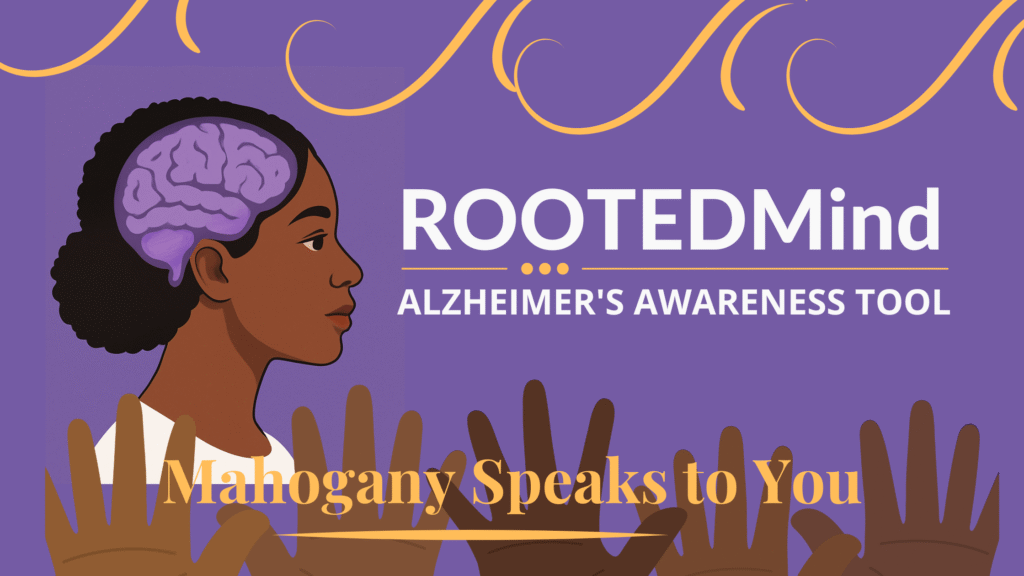
Sis, let’s have an honest talk. Not a scary one, but a loving and honest one. We must talk about our minds, memories, and futures. We need to talk about Alzheimer’s disease, a silent thief that is stealing the stories and wisdom of our grandmothers, mothers, and aunties at an alarming rate. For Black women, this isn’t a distant problem. A health crisis is happening right here, in our homes and hearts.
But this is not a story of fear. This is a story of power, knowledge, and the fierce love we have for ourselves and our community.
Listen to the Podcast!
The Hard Truth in Black and White
Let’s be clear about the numbers, because they tell a story we need to hear.
- Black Americans overall are about twice as likely to develop Alzheimer’s disease as white Americans.
- Women make up nearly two-thirds of all Americans living with Alzheimer’s.
When you combine those two facts, you see the truth: we, as Black women, are standing right at the center of this storm. The Alzheimer’s Association reports that by age 65, Black Americans have a significantly higher lifetime risk of developing the disease. For many elders, the risk is as high as 1 in 3.
Think about that. In a room with two of your best girlfriends, one of you could be on this journey one day. That’s why we have to act now.
Why Us? It’s More Than Just Our DNA
You might be thinking, “Does this run in my family?” While genes play a small part, our high risk is about so much more. It’s a tangled web of our health, our stress, and the world we live in.
1. What’s Good for the Heart is Good for the Brain
Our community has higher rates of certain health conditions that are directly linked to brain health:
- High Blood Pressure (Hypertension): Think of the blood vessels in your brain as tiny, delicate pipes. High blood pressure puts stress on them, causing damage over time that can lead to memory loss and vascular dementia.
- Type 2 Diabetes: When your blood sugar is out of control, as can occur with Type 2 Diabetes, it can cause inflammation and damage to brain cells, making it harder for them to communicate.
- Heart Disease & Obesity: Heart disease and obesity also strain your vascular system, reducing blood flow to the brain, which it needs to stay sharp.
2. The Invisible Weight: Stress and Our Brains
Scientists have a term for the physical cost of long-term stress: “allostatic load.” It’s the wear and tear on your body from a lifetime of stress. As Black women, we carry a unique load. We are often the caregivers, the providers, the “strong friends,” and the ones navigating daily microaggressions and systemic racism. This isn’t just “in your head.” This chronic stress releases hormones that can, over many years, impact your brain’s memory center.
3. The Unsung Heroines: Our Caregiving Role
We are the backbone of our families. Research shows that Black caregivers, who are most often women, provide more hours of care than their white counterparts. They are also more likely to be the sole person responsible for a loved one’s care, leading to higher rates of financial strain and emotional distress, all of which are major risk factors for our health down the line.
4. When the System Fails Us: The Diagnosis Gap
Too often, our concerns are not taken seriously. Memory loss is brushed off as a “normal part of aging.” Many standard memory tests were not designed for or tested on people with our cultural or educational backgrounds, leading to inaccurate results. Because of this, Black Americans are often diagnosed much later, when the disease is already in an advanced stage. We deserve better.
This is a Fight We Can Win: Your Power Playbook
This knowledge is not meant to weigh you down; it is intended to arm you. A landmark study from The Lancet Commission found that up to 40% of dementia cases could be prevented or delayed by addressing risk factors. Here’s how we claim that power.
Know Your Numbers, Protect Your Mind.
Your blood pressure, cholesterol, and A1C (blood sugar) numbers are not just for your heart—they are your brain’s report card. Get them checked regularly. Think of your blood pressure cuff as a brain health tool.
Move Your Body, Feed Your Brain.
You don’t need a fancy gym. A brisk 30-minute walk, dancing to your favorite music in the living room, or gardening can boost blood flow to the brain. Feed your mind with leafy greens (like collards and kale), colorful berries, and fish rich in omega-3s. What you eat directly fuels your brain cells.
Demand to Be Heard in the Doctor’s Office.
You are the expert on your own body. Do not be dismissed if you feel like something is off with your memory or thinking.
- Prepare: Write down your questions and concerns before your appointment.
- Bring an Advocate: Ask a trusted friend or family member to come with you to be a second set of ears.
- Be Direct: Say, “I am concerned about my brain health, and I would like to have a cognitive assessment.”
Claim Your Rest as Your Right.
Sleep is not a luxury; it’s a necessity. It’s when your brain does its cleanup work, washing away toxins that can build up and lead to Alzheimer’s. Protect your sleep. Say “no” when you need to. Your peace is not selfish; it is essential for your long-term health.
For Our Mothers, For Our Daughters, For Ourselves
This is more than a health issue; it’s a social justice issue. It’s about fighting for our right to age with dignity, clarity, and our precious memories intact. It’s about honoring the women who came before us and protecting the minds of the girls who will come after us.
Your mind holds your laughter, wisdom, recipes, and stories. It is a treasure. Let’s protect it together.
Keep Learning and Take Action
Explore more resources and tools at MahoganySpeaksToYou.com. Join our community as we share stories, expert advice, and support that speaks directly to us.

ROOTEDMind™ Alzheimer’s Awareness Tool
Check any symptoms you’ve noticed for yourself or a loved one:
References
Alzheimer’s Association. (2025). 2025 Alzheimer’s disease facts and figures. Alzheimer’s & Dementia, 21(3). https://www.alz.org/alzheimers-dementia/facts-figures
Centers for Disease Control and Prevention. (2024). Promoting brain health: Addressing cardiovascular disease and its risk factors in the African American community. U.S. Department of Health and Human Services. https://www.cdc.gov/aging/publications/index.html
Geronimus, A. T., & Parker, L. J. (2023). Weathering and allostatic load: The psychosomatic costs of chronic stress and systemic inequity on brain health. American Journal of Public Health, 113(8), 894–903. https://doi.org/10.2105/AJPH.2023.307315
Livingston, G., Huntley, J., Sommerlad, A., Ames, D., Ballard, C., Banerjee, S., Brayne, C., Corbett, A., Firbank, M., Gustavsson, A., Hill, S. L., Howard, R., Larson, E. B., Mukadam, N., Perry, G., Ritchie, C., & Burns, A. (2020). Dementia prevention, intervention, and care: 2020 report of the Lancet Commission. The Lancet, 396(10248),1 413–446. https://doi.org/10.1016/S0140-6736(20)30367-6
National Alliance for Caregiving & AARP. (2020). Caregiving in the U.S. 2020. https://www.aarp.org/ppi/info-2020/caregiving-in-the-united-states.html